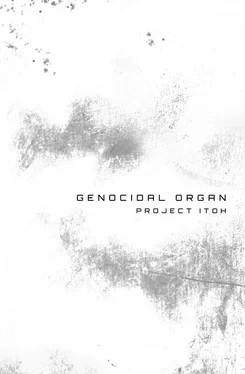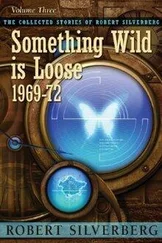Project Itoh - Genocidal Organ
Здесь есть возможность читать онлайн «Project Itoh - Genocidal Organ» весь текст электронной книги совершенно бесплатно (целиком полную версию без сокращений). В некоторых случаях можно слушать аудио, скачать через торрент в формате fb2 и присутствует краткое содержание. Год выпуска: 2012, ISBN: 2012, Издательство: Haikasoru/VIZ Media, Жанр: Старинная литература, на английском языке. Описание произведения, (предисловие) а так же отзывы посетителей доступны на портале библиотеки ЛибКат.
- Название:Genocidal Organ
- Автор:
- Издательство:Haikasoru/VIZ Media
- Жанр:
- Год:2012
- ISBN:9781421550886
- Рейтинг книги:4 / 5. Голосов: 1
-
Избранное:Добавить в избранное
- Отзывы:
-
Ваша оценка:
- 80
- 1
- 2
- 3
- 4
- 5
Genocidal Organ: краткое содержание, описание и аннотация
Предлагаем к чтению аннотацию, описание, краткое содержание или предисловие (зависит от того, что написал сам автор книги «Genocidal Organ»). Если вы не нашли необходимую информацию о книге — напишите в комментариях, мы постараемся отыскать её.
Genocidal Organ — читать онлайн бесплатно полную книгу (весь текст) целиком
Ниже представлен текст книги, разбитый по страницам. Система сохранения места последней прочитанной страницы, позволяет с удобством читать онлайн бесплатно книгу «Genocidal Organ», без необходимости каждый раз заново искать на чём Вы остановились. Поставьте закладку, и сможете в любой момент перейти на страницу, на которой закончили чтение.
Интервал:
Закладка:
To fight for the greater good. Before the birth of the nation-state, that motive would have been right at the bottom of the list, if it featured at all. People fought in wars to advance their own interests or to make money. War was a specialist subject. Even if a soldier felt allegiance with the group that he was fighting alongside, it would never have occurred to him to think on the scale of “for the sake of all the people in my country.” Citizens did go to war, almost always in the form of a mercenary transaction: pay me this much, and I’ll lend you my arms for this length of time. Patriotism never even entered the picture until after the establishment of the national army. How could it? The concept of a standing army, a body of loyal troops that could be called upon at a moment’s notice, simply didn’t exist. Take the British fleet that against all odds miraculously managed to break the invincible Spanish Armada. It was a historic battle that changed the course of history forever by establishing British naval supremacy—and yet over half of the ships that fought that battle were souped-up merchant frigates, armed just for the occasion. Since time immemorial, war meant hiring mercenary forces as and when you needed them.
In other words, the very psychology of sacrificing yourself for your country was an extremely recent development. Taking a historic perspective, PMCs and independent contractors were actually the norm, and national armies such as the US or British armed forces were the aberrations. It was only recently that the business of war changed to become what we now know as modern warfare.
Ordinary citizens only started going to war out of patriotism after war became theirs —in other words, after they started feeling that the country was governed in their own interests. The exact form didn’t matter; it could be a representative democracy as in America, or a popular form of limited constitutional monarchy, as in Britain. The people were happy with their leaders and the leaders had taken them to war, so the people were happy with the war. It was their war. And if it was their war, well then, it was the most natural thing in the world that they should take responsibility for it. Dress that responsibility up with fancy ribbons and voilà: patriotism.
You fought to protect someone. Your father or your mother or your sister.
Fundamentally it was an act of self-sacrifice. An act of neighborly love. An act of altruism, admittedly within certain preset parameters. Accordingly, war was fought out of love. The so-called mutually exclusive desires to love other people and kill other people had, on the battlefield at least, managed to reconcile with each other.
This was what John Paul was talking about right now.
I love therefore I kill.
“When I lost my wife and daughter in the nuclear blast I made a decision. That I would never let that sort of thing happen again. That I’d had my fill of sorrow.”
“But you’re the one causing all the sorrow!” Lucia bit down on her lip. “You led all those people to their deaths—you’ve spread sorrow across the world!”
“True, but it’s a sorrow that people choose not to notice.”
For the briefest of moments I thought that I detected a flash of despair in John Paul’s words. “What do you mean?” I asked.
“People see only what they want to see. People don’t care about the tragedies that happen elsewhere in the world. If you spend too much time worrying about them, you just end up overwhelmed by a sense of your own helplessness. Or possibly it’s a case of people actually being helpless to do anything about it, so they can’t be bothered to take an interest. It’s pretty pathetic, but it’s still my world. It’s where I grew up. People go to Starbucks and shop online at Amazon and live their lives seeing just what they want to see. It’s decadent and wasteful and shallow, but I love that world nonetheless, and I care deeply for the people who inhabit it. What is civilization? Conscience is a brittle and fragile thing. Civilization generally involves working toward the happiness of other people in your world. But we’re not there yet. No one yet has seriously taken it upon themselves to rid the world of all its sorrows.”
A world of CNN clips. The ubiquitous Domino’s Pizza. Movies streamed straight to your house, the first fifteen minutes free. Metahistories that only go skin deep. That’s about as far as our ethics of our civilization went.
“The people of my world seem to have become obsessed with personal identification and surveillance, even though these are almost completely ineffective as antiterrorist measures. When terrorism is born out of hopelessness and despair, traceability is no deterrent. Why should a suicide bomber care whether or not he’s going to be identified after the event?”
“Yes, Lucius often used to say things like that,” Lucia said.
“And so I considered the situation,” John Paul said. “Rather than wait until they start hating us, why not make them hate each other? We don’t have to let them kill us. We can focus their energies so that they only kill people within their own worlds. We can keep our world separate from theirs. A world of hatred and death for them, and a world of peace for us.”
Find a country teetering on the edge, a country jealous of our wealth and leisure. A country that hated us.
A country that was starting to realize that their own misery and poverty was a byproduct of our freedom. That the corollary of our economic imperialism was their economic servitude.
And then, just before they got around to actually doing something about it, find a way to enter that country and introduce the grammar of genocide.
Once the resultant civil war kicked off, the country would no longer have the will or the capacity to turn its anger outward. Once the genocide began, there was no room left for thinking about killing people in other countries; you were too busy killing people in your own. The seething rage that had been about to spill over into the outside world in the form of terrorist attacks would now be contained, neutralized. John Paul had been sowing the seeds of destruction as a preventative measure against terrorism. His genocidal world tour was a preemptive strike against those who might one day seek to attack his world.
“I get them to kill each other. I’m not letting them lay a finger on my world ever again. The deep structure of the grammar is always the same, but it needs to be rendered differently for each language, according to the syntax. This makes it very easy to control. Each time my target existed in a distinct linguistic milieu. As long as you don’t need to use English to spread your message, it’s a pretty straightforward task to adjust the parameters every time you want to introduce the grammar to a new territory.”
“Do you honestly believe that what you’re doing is fighting terrorism ?” I asked.
“The statistics speak for themselves. Look at the data released by your own, the US State Department—all in the public domain, of course. The fact was that the incidence of terrorist attacks was increasing exponentially, even as we busied ourselves by submitting to a biometric surveillance state. It was only after I started planting genocide around the world that incidences of terrorism in the US truly started falling. And now, there is none. Mission accomplished. Of course, there is a trade-off, and the price we pay is the sharp increase in civil wars, ethnic conflicts, and massacres in Third World countries.”
John Paul lifted his head and closed his eyes as if to congratulate himself on a job well done.
“I’m not saying for a moment that what I’m doing is right or fair. I’m just doing what I can to protect that which I want to protect,” he said.
Читать дальшеИнтервал:
Закладка:
Похожие книги на «Genocidal Organ»
Представляем Вашему вниманию похожие книги на «Genocidal Organ» списком для выбора. Мы отобрали схожую по названию и смыслу литературу в надежде предоставить читателям больше вариантов отыскать новые, интересные, ещё непрочитанные произведения.
Обсуждение, отзывы о книге «Genocidal Organ» и просто собственные мнения читателей. Оставьте ваши комментарии, напишите, что Вы думаете о произведении, его смысле или главных героях. Укажите что конкретно понравилось, а что нет, и почему Вы так считаете.












